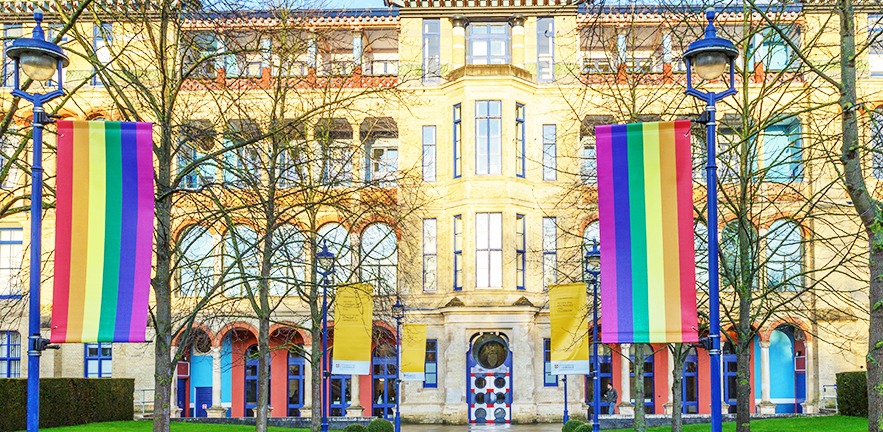As Cambridge Judge celebrates Pride month, we spoke to four of our alumni about what being LGBTQIA+ means to them.
The corporate world has made progress in embracing the LGBTQIA+ community, but representation at senior management level remains very low. We spoke to four LGBTQIA+ alumni of Cambridge Judge Business School so they could share during Pride month in June their experiences and roles as agents of change, how the business community can better reflect diversity, and about Pride@Cambridge Judge.
Being gay doesn’t define you
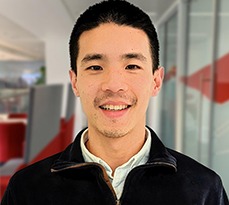
Sam Chong (MBA 2018), Innovation Lead at Bain & Company, has always been very results-driven; when he was younger, he was a competitive swimmer at both national and international level and represented his native country, Malaysia, where being gay is still a criminal offence. It was a difficult culture in which to find his identity, yet Sam has never felt that he has had to prove himself because of his sexuality; what matters is knowing your self-worth and being gay is just one aspect for him. “Being gay doesn’t define you. It doesn’t make you swim faster,” says Sam.
Self-worth isn’t a given and sometimes comes with experience, as was the case for Jiajie Charles Su (MBA 2018). A Programme Manager at Meta, he grew up in China where the LGBTQIA+ community was, and still is, regularly stigmatised. Charles felt that he had to work hard and succeed to avoid being a target of bullying and aggression. As he became more comfortable in his own skin, he realised that self-respect is far more important than what other people think. He now feels less pressure to outperform his peers and instead focuses on finding ways in which members of the LGBTQIA+ community can help each other succeed together.
Why Pride month matters
For our alumni, Pride month is a time of both celebration and reflection. Charles comments that it’s important to observe Pride month to “remember the struggles and challenges we have overcome, to celebrate the progress we have achieved, and to continue to amplify the voice of the LGBTQIA+ community globally so that countries that are more intolerant will feel the pressure to change.”
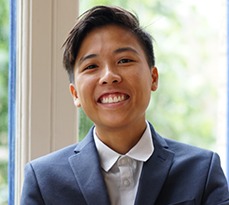
Kin Man Claudia Chau (MBA 2020), Senior Programme Manager, Transportation Sustainability at Amazon, highlights the lack of visibility for LGBTQIA+ people in the corporate world and sees Pride month as a time to change this, as well as “a time for us to recognise how far we’ve come and how far we have yet to go”. Claudia cites research carried out by the Human Dignity Trust, which found that over 70 countries still criminalise LGBTQIA+ people.
Pride month is not just about the LGBTQIA+ community, it’s also about creating the right inclusive environment for all underrepresented groups. There is an intersectionality between the different communities, which share many commonalities. Raising awareness of LGBTQIA+ rights creates a more empathetic society, and one group doesn’t eclipse another.
According to Pankaj Nanda (MBA 2019), impact consultant and a promoter of LGBTQIA+ rights, “While it is important to celebrate Pride in June and commemorate the efforts of the LGBTQIA+ community who have achieved so much, June should not be the only month in which we talk about LGBTQIA+ people; the conversation should be year round followed by conscious efforts to foster diversity.”
Pankaj believes that companies can take small steps in the right direction to make LGBTQIA+ people feel more welcome, for example, creating structural support for trans employees and addressing microaggressions. Comments by colleagues and peers such as “you don’t look gay” remind Pankaj that there is a stereotypical image of the gay community that needs to change.
Microaggressions may not always be intentional, as acknowledged by Sam. “Someone doesn’t have to be their best self just because I am part of a minority group. It’s not fair. Both of us have socially contracted to interact with each other, so we should do what we can for each other. If a single word could bring you down, you’re probably grappling with bigger issues.”
LGBTQIA+ rights a litmus test in the corporate world
In the corporate world, traditionally seen as a very aggressive kind of environment where heterosexuality is the norm and where a lot of gay people might feel out of place, progress is slow. There are currently only four openly LGBTQIA+ CEOs in the Fortune 500 companies. Claudia attributes this low figure to lack of diversity and inclusion initiatives at mid and senior level and to the discrimination and disparity that older LGBTQIA+ members face, noting that senior business leaders are often of an older generation that grew up in an era when the public was much less accepting of the LGBTQIA+ community. Corporations need to regularly review their DEI policies to establish and maintain a zero-tolerance policy to any kind of discrimination, to provide equal opportunities, and to reduce the fear of self-identification so that everyone feels safe and empowered at work.
Not all companies walk the walk. It’s a sad fact that some companies currently sponsor a Pride flag on a highway but don’t have the same parental leave for same-sex couples. To recruit the best talent, a company must be open and inclusive, and this is what will drive change, not only for the LGBTQIA+ community but for other underrepresented groups as well. According to Sam, “LGBTQIA+ rights have always been the litmus test for many other minority groups to join a company.”
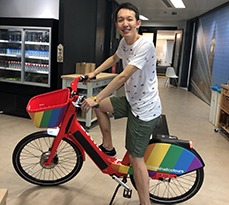
Talented employees, however they identify, will leave a company if not treated well. LGBTQIA+ people should not be held hostage by their employers. If an LGBTQIA+ employee feels that they are not being protected at the workplace, then they should know their worth and leave.
Change is happening, and the corporate world is becoming more welcoming to the LGBTQIA+ community. According to the Human Rights Campaign (HRC), 91% of Fortune 500 companies prohibit discrimination based on sexual orientation, and 83% prohibit discrimination based on gender identity, compared to just three in 2000. “Many companies like Meta have dedicated diversity teams, employee groups and staff volunteers,” says Charles. “They put a lot of effort into promoting diversity and inclusion both within the company and on the recruitment front to target candidates from underrepresented backgrounds.”
Pride@Cambridge Judge
Charles and Sam were two of the founding members of Pride@Cambridge Judge, an affinity group to which the LGBTQIA+ community could relate. The founding members united and focused on goals that they all shared. Pride@Cambridge Judge became a safe place where people could ask questions without the fear of being labelled. The Business School has now committed more resources to the group.
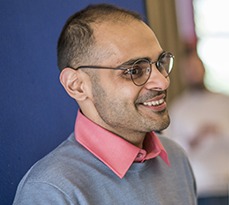
During his MBA year, Pankaj was Co-chair of Pride@Cambridge Judge. “To create change, you sometimes need to rock the boat and ruffle some feathers. While at Cambridge, I tried to do that by painting the School with rainbow flags during LGBTQIA+ History Month.” When studying at Cambridge Judge, Pankaj was part of a social media campaign that involved students writing messages for others with the hashtag ‘love is for all’. This campaign really took off and Pankaj found it heart-warming to see the support from the entire straight ally group for a person from India.
“The acceptance and support of the ally community at Cambridge Judge confirmed that the School is somewhere that members of the LGBTQIA+ community can be their true selves,” says Pankaj.


